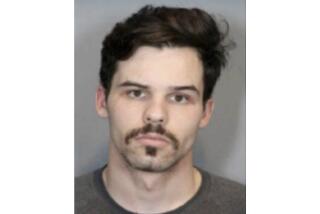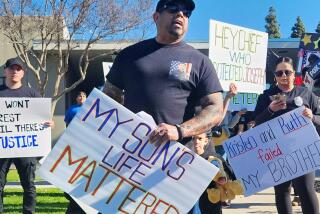Officer goes beyond her beat to help reunite woman and sons
WATSONVILLE, Calif. — She introduced herself as Sarani Hernandez and said in Spanish that she needed help. She took a seat in the lobby of the police station.
Officer Elizabeth Sousa was asked to talk to her. It was a quiet morning a few days after Thanksgiving. She listened as the woman began telling the story of an abduction.
Her two boys were being held in Juarez, Mexico, she said; they were U.S. citizens.
Hernandez opened her cellphone to a picture of Edwin and Angel, sent as evidence they were still alive. They were 11 and 9 years old. She said that she had been sending money for almost 18 months and that the kidnappers had threatened to kill her.
Sousa saw her desperation. A victim of misplaced trust, Hernandez was alone, undocumented and had nowhere to turn other than the police.
“The people who had her kids had no heart,” Sousa said. “They had no interest in anyone but themselves. All they cared about was the green.”
Within a week, the FBI had taken over the case and sent special agent Christina Chesson to Watsonville to interview Hernandez. Sousa hoped she could stay involved.
Hernandez reminded Sousa of her parents, who had come to this city from the Azores in the 1970s. They arrived with little more than their hope, and each worked two jobs while learning English at night and eventually became citizens.
Sousa saw that Hernandez also wanted to follow that path.
::
With her car radio tuned to a pop station — Lady Gaga and One Direction providing backbeat to the dispatcher’s alerts — Sousa, 27, patrols the streets of Watsonville. After four years as a patrol officer, she knows what alleys and parking lots to cut through on calls.
Making traffic stops, rousting addicts, keeping an eye on gang members and parolees are daily fare, but family mediation is the most common call: domestic disputes, parents struggling with children. She sometimes feels as if she’s raising other people’s children, keeping them out of trouble, protecting them from custody battles and abuse.
Hernandez, 33, came to the U.S. more than 10 years ago, living in Chicago and then in Mount Vernon, Wash. She and her boyfriend went back to Mexico with the boys in 2008.
The boyfriend eventually left Hernandez. Three years later, she returned to Mount Vernon, where she met Jesus Salinas and Patricia Delatorre, who agreed to bring her boys back to the U.S. She paid them $1,300, and Edwin and Angel were picked up from Hernandez’s mother.
Sousa doesn’t judge Hernandez for turning her children over to strangers. Hernandez didn’t want to expose them to the risks that she faced crossing the border; she just needed someone to accompany them on the bus home.
Days later, Salinas said Edwin and Angel had been denied entry and were in Juarez with Delatorre’s mother, Maria Castaneda.
According to Sousa and the federal indictment filed in the case, Hernandez began sending weekly payments to Mexico. All told, she paid about $5,000 — earnings from field work and housekeeping — for the return of her children.
Castaneda and Delatorre threatened to kill Hernandez, according to the indictment, if she went to Juarez or contacted authorities.
The FBI declined to comment for this story, and Sousa would not make Hernandez available for an interview.
Sousa was never certain why Hernandez ended up in Watsonville. She knows that Hernandez felt unsafe in Mount Vernon and was sure that once the berry season started, she’d be able to find work in this town on the edge of Monterey Bay.
As the FBI followed leads in Mount Vernon and Juarez, Chesson met with Hernandez to gather information for the indictment. Sousa translated, worrying that Edwin and Angel had been sold or were dead.
For months, Hernandez had not been allowed to speak to them. Then Castaneda relented. Over the phone, Sousa heard voices of children.
No, no, Hernandez said to her boys, crying in relief. I’ve been trying to bring you home.
On Dec. 11, the FBI and Mexican law enforcement found Edwin and Angel, but Mexican social services placed the boys in a children’s home. According to Pamela Brown, an attorney who provided assistance on the case, Mexican authorities needed to investigate claims made by Castaneda that Hernandez had abandoned her sons and that the former boyfriend had abused them.
The FBI, said Brown, faced numerous obstacles in securing Edwin and Angel’s release. The boys, having spent more than a year with Castaneda, corroborated her claims, and neighbors and officials at the school they attended in Juarez said the boys were happy and well taken care of, according to Brown.
Throughout it all, Sousa never doubted Hernandez. “Her character and demeanor convinced me that what she said was true,” she said.
In early January, the FBI arrested Salinas and Delatorre in Mount Vernon, but Castaneda had disappeared. Her arrest warrant is outstanding.
Chesson petitioned the U.S. consulate and arranged for Hernandez to be interviewed by Child Protective Services. By mid-February, there was still no outcome. Brown described Chesson and Sousa’s diligence as extraordinary.
“They went beyond what others would have done,” Brown said. “Law enforcement or social services are so overloaded with missing-person cases that there is a tendency, conscious or unconscious, to view people as worthy of help or not, and what Hernandez had going against her would have turned others off.”
About two weeks later, the news came: Hernandez and her boys would be reunited.
::
As the jet landed in a cold and windy El Paso, Sousa appreciated for the first time the magnitude of the case.
As she and Chesson waited in the terminal, a door opened, and Sousa recognized Edwin and Angel from the cellphone picture.
When Angel asked for help, Sousa told him she was there to translate. At the airport, she and the agent helped the boys buy a toy pony as a gift for their mother.
On the flight home, Sousa allowed herself to think about the future. Salinas and Delatorre were awaiting trial in San Jose on federal charges of kidnapping and seizure and detention of U.S. citizens. Sousa thought about the children and teenagers she has counseled to stay in school and out of gangs.
“You guys have to behave,” she told Edwin and Angel. “If you give your mom any trouble, I’ll come find you.”
As the boys were escorted off the plane, Chesson and Sousa fell behind, and when they caught up, Hernandez and the boys were holding one another.
When Sousa got home that evening, her husband was outside. In the dimming light, they sat on the tailgate of his truck.
You changed the lives of these boys forever, he told her.
She knew he was right. She just hadn’t had time to think about it.
More to Read
Start your day right
Sign up for Essential California for news, features and recommendations from the L.A. Times and beyond in your inbox six days a week.
You may occasionally receive promotional content from the Los Angeles Times.







